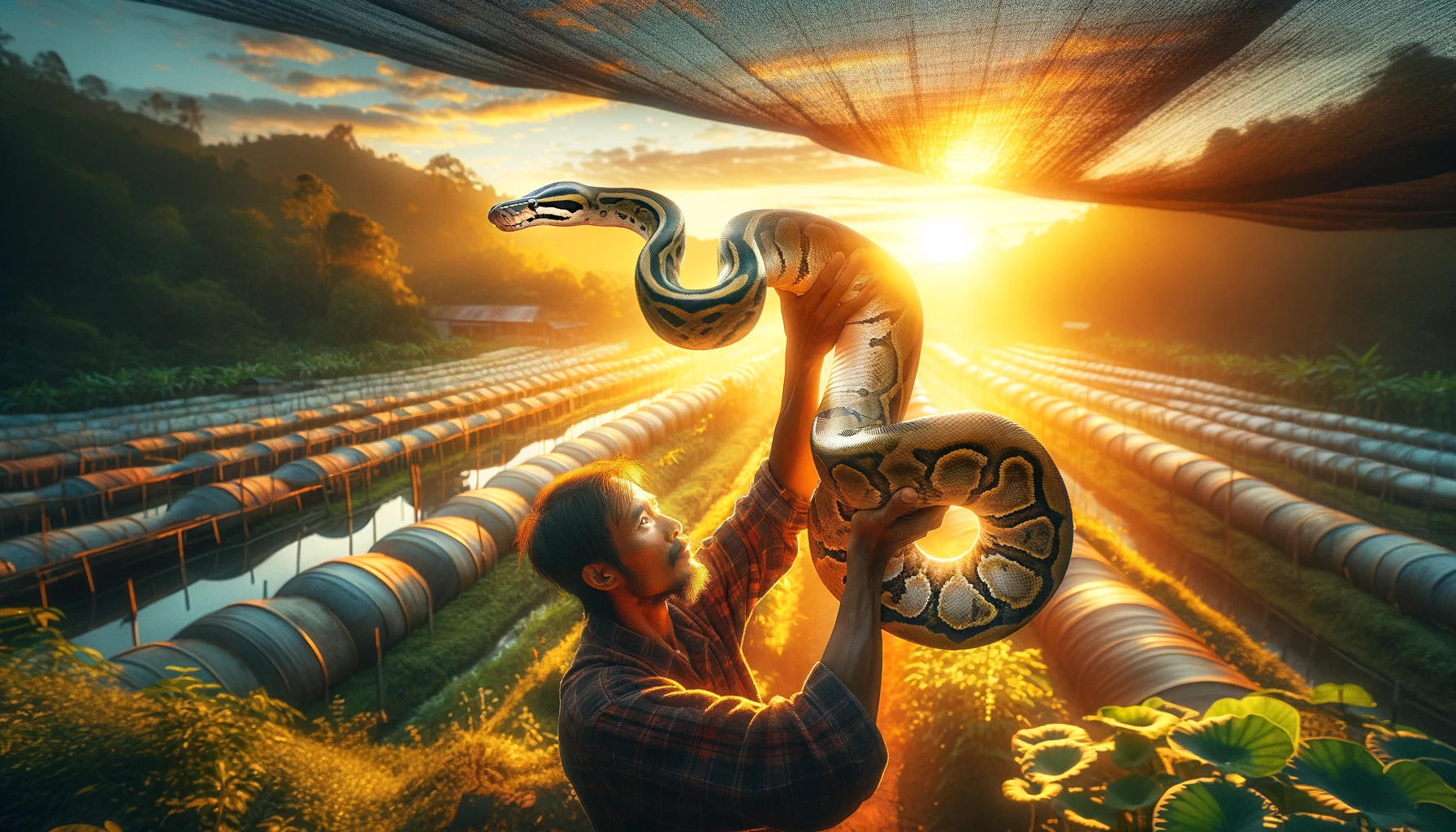As our natural resources are dwindling, and the climate is becoming more unpredictable, we’re in dire need of innovative and sustainable ways to produce our food. That’s where python farming comes into play, a novel approach that might sound straight out of a science fiction novel but is grounded in practical, scientific research.
In an exciting study, scientists ventured into the world of python farming in Asia, a concept that’s been around there but hasn’t caught much attention globally. They focused on two types of pythons, the reticulated python and the Burmese python, at farms in Thailand and Vietnam, to see just how efficient these creatures could be as a food source.
What they found was fascinating. Pythons grow quickly, with females outpacing males in the race to get big. They discovered that what these pythons ate when they were young played a huge role in how fast they grew throughout their lives. These reptiles can go without food for months without losing much body weight, making them incredibly resilient in unpredictable environments.
The study revealed that pythons could convert food into body mass more efficiently than any livestock we’re used to, like chickens or cows. Plus, they don’t need as much space or water, making them an environmentally friendly option. And when it’s time to harvest, most parts of the python are usable, from their meat to their skin.

But why consider pythons as a food source? Our current livestock and agriculture practices are struggling to keep up with the demand for food worldwide. Issues like climate change, diseases, and diminishing natural resources are making it harder to sustain these traditional food sources. Pythons, on the other hand, are ectotherms—animals that rely on external sources for body heat. This means they need less energy and, consequently, less food to grow, which could make them a sustainable option for food production.
Interestingly, the idea of eating reptiles isn’t new. In many parts of the world, including some Asian and African countries, reptile meat is a common part of the diet. It’s considered a valuable source of protein and is linked to various cultural and medicinal practices. This study suggests that with careful management and further research, python farming could be expanded and improved, offering a novel and sustainable way to produce food.
Now, before you start thinking of pythons as just another type of livestock, it’s important to note that this concept might not be for everyone. People have different cultural and personal preferences that influence what they consider edible. Plus, the logistics of python farming—like ensuring the snakes are fed properly and managing their enclosures—require specialized knowledge and resources. But as the world looks for more sustainable and flexible food production methods, python farming shines as a beacon of potential.
This article is based on the following article:
https://www.nature.com/articles/s41598-024-54874-4

Background Information
By understanding these foundational concepts, readers can better appreciate the significance of exploring alternative food sources like python farming. This knowledge not only broadens their understanding of global food security challenges but also highlights the importance of innovation and sustainability in shaping the future of food production.
Understanding Ecosystems
Ecosystems are communities of living organisms and their physical environment, interacting as a system. These include forests, rivers, and grasslands, each supporting various forms of life. Ecosystems are critical because they provide essential services like clean air, water, and soil which are the foundation of agriculture. Understanding ecosystems helps us recognize the importance of biodiversity and the role of each species within an ecosystem, including predators like pythons.
Traditional Agriculture vs. Alternative Farming Practices
Traditional agriculture involves widely practiced methods of farming for crop production and animal husbandry, which have been developed and refined over thousands of years. This includes large-scale farming of staple crops like wheat, rice, and corn, and the rearing of livestock such as cattle, pigs, and chickens. However, traditional agriculture faces challenges like resource depletion, environmental degradation, and climate change. Alternative farming practices, including python farming, offer potential solutions by being more sustainable, using fewer resources, and causing less environmental impact.
Sustainability in Food Production
Sustainability in food production is about meeting current food needs without compromising the ability of future generations to meet theirs. It involves managing resources wisely, reducing waste, and minimizing environmental impacts. Sustainable practices aim to maintain the health of ecosystems, use water and energy efficiently, and ensure that the food production system is resilient to challenges like climate change.
Pythons: An Overview
Pythons are a family of non-venomous snakes found in Asia, Africa, and Australia. They are known for their size, with some species being among the largest snakes in the world. Pythons are predators that play a significant role in their ecosystems by controlling populations of their prey, such as rodents. They have a slow metabolism, which means they can go for long periods without eating, and they grow rapidly under the right conditions. This makes them interesting candidates for sustainable farming.
Python Farming as an Alternative
Python farming involves raising pythons in controlled environments for food, skin, and other products. It is considered a form of sustainable agriculture because pythons convert food to body mass more efficiently than traditional livestock, require less land and water, and their farming produces lower greenhouse gas emissions. Python meat is a source of protein, and in cultures where eating reptiles is acceptable, python farming could contribute to food security and economic development.

Debate/Essay Questions
- Should cultural preferences influence global acceptance of alternative food sources like python meat?
- Can the environmental benefits of python farming outweigh potential ethical concerns regarding python farming?
Please subscribe to Insight Fortnight, our biweekly newsletter!
